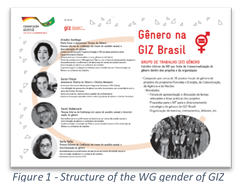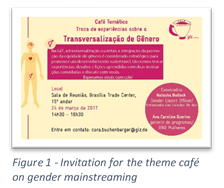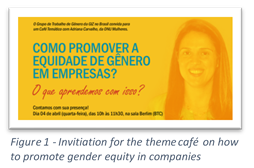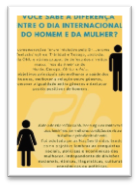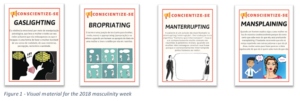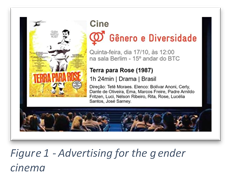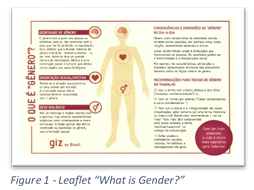GIZ Brazil’s gender working group (WG gender) has been improving and expanding its activities with the objective of transforming the organizational culture of GIZ on gender equity and respect for diversity. As Brazil is increasingly distant from achieving gender goals, micropolitics might leverage the transformation bringing visibility, reflection and changes in the personal attitude of each staff member of GIZ Brazil. Thus, we are proud to present the proposal of the gender WG for the gender competition of GIZ 2020.
Gender Inequality in Brazil
Despite the existence of movements that aim to reach gender equity in Brazil the reality is still far from that. Women are structurally prevented from getting involved in political structures and gaining influence by many obstacles in daily life. Aspects like remuneration, double workload through family and career and little possibilities for promotion inhibit them from changing the unequal structure that has been perpetuated for centuries by governments that mostly represented men.
Although there have been some significant improvements in the area of education the inequalities in the labour market remain high. This can be seen in the differences in access to formal employment and the payment gap between men and women. In 2015, the average income of women made up only 75 percent of the average income of men, falling to 68 percent if only considering leadership positions and to 58 percent in the case of women with 12 or more years of schooling. In addition, women are still under-represented in management positions. Only 18 percent of all companies employ female managers while 59 percent of all companies have women working with them.
As if this were not enough, there are still huge inequalities based on skin color in Brazil. With a population of about 90 million Afro-Brazilian people in 2014 with 48 percent, black women were the group with the lowest participation in the formal labor market, while white men were the group with the highest participation with 65 percent. In addition, only 1.6 percent of the leadership positions were held by women with black skin[1].
In the 2017 United Nations Gender Inequality Index (GII) [2] Brazil ranks 94th out of 160 countries and, according to the World Economic Forum’s latest Global Gender Gap Report (GGGR), fell from 79th to 95th (out of a total of 149 countries) between 2016 and 2018. However, Brazil performs very differently in the four dimensions of the index: although the country has achieved the goal of gender equity in health and education, it lags far behind in economic participation and opportunities (position 92) as well as political empowerment and participation (position 112)[3].
The Reality of GIZ Brazil
GIZ Brazil had 173 staff members in June 2019 with 36 of them being interns and 12 in management positions. 111 of the employees were women and 62 men. Among all staff was only one person with disabilities.
Regarding the women, 16 of them were AMA of whom three held management and 12 technical positions. The other 95 women were NP with only one of them in a management position. Six of them had senior positions, 57 were professionals, 16 juniors and 15 were in auxiliary or support positions. When looking at gender and race in an intersectional approach, one can note that all of the six women that are part of the housekeeping team self-declared as black or pardo[4] in contrast to only seven out of a total of 42 women in technical positions.
With respect to men, there are 22 AMA, 13 of them in management and eight in technical positions, and 40 NP with only one of them in a management position and five in senior positions. The others are 17 technical advisors, four junior technical advisors, two administrative assistants, seis junior administrative assistants, three auxiliaries and two supports. Of all the men, only 14 declared themselves black, as opposed to 32 whites.
WG Gender – importance and participation
GIZ Brazil’s WG gender was founded in 2012 with the objective of promoting gender equity both within GIZ, supporting and developing activities among staff members, as well as in projects and with partners, promoting and giving advice on the topic.
Currently, the WG gender consists of about 20 gender focal points in the Tropical Forests, Energy and Communication sectors as well as the Administrative Center of GIZ Brazil. Additionally, GIZ Brazil has appointed one member of the working group as gender contact person and since July 2019 there are two technical advisors for the gender topic (30 % and 50 % NP) who share the responsibility of monitoring the topic in the projects.
The working group’s activities include a forum for presentation and discussion of relevant topics, best practices of the projects, proposals to the Management Team for the strategic orientation of GIZ Brazil regarding gender as well as the organization of events, trainings, debates and campaigns.
Partnerships, events and contributions
Every year, the gender working group organized internally in order to diversify and increase its activities dividing responsibilities between the group members and finding new partnerships within and outside of GIZ. Notable events of the recent years were:
- Theme cafés: informal internal meetings with the objective of discussing broader issues than those dealt with in the different project’s day-to-day business, seeking a connection between everyone’s work and what is being discussed and built in the world in relation to sustainable development. In all its years of existence, the WG gender used this format to discuss different questions on gender issues. In 2019, there were meetings on the new GIZ Gender Strategy and The Safeguards and Gender Management System. To celebrate International Women’s Day, GIZ colleagues were invited to reflect on the current perspectives for gender equity in the German-Brazilian cooperation. In 2018, GIZ Brazil launched its policy against sexual harassment and gender discrimination at the workplace. Furthermore, there were discussions with the participation of UN Women on how to promote gender equity in companies with a focus on the seven principles of women’s empowerment (WEPs) in a café. In 2017, gender mainstreaming was discussed with the participation of UN Women and USAID.
- Masculinity week: celebrated for the first time in 2017, the activities during this week focus on the importance of involving men in the discussion of gender equity. In the first year, the concept of masculinity was discussed with the support of an external consultancy; in the following year, an internal team prepared a reflection campaign that introduced concepts such as mansplaining, manterrupting, gaslighting and bropriating, discussed the difference between a typical man’s day and a typical woman’s day, expanding the participation of men as partners in the fight for equity. This year’s masculinity week comprised activities about the role of men in society as agents of change in favour of gender equity.
- Gender cinema: with the aim of enriching the debate on gender issues in a playful way, increasing the visibility of the working group, Gender cinema debuted in 2019 with a diversified movie program ranging from national and international documentaries to current comedies and historical dramas. The event takes place once per month in one of the meeting rooms of the headquarters of GIZ Brazil during lunchtime. More and more people have been attracted willing to debate topics related to gender equity brought up in the movies.
- PR materials: The WG also produces visual materials with the goal of increasing the outreach of information on gender issues. One example is the folder “What is Gender?” which provides definitions on gender identity, sexual orientation, biological sex, pointing out their differences and also guides on how to create an attitude that values respect and equity in the workplace. Recently, the leaflet “Race and Gender Intersectionality” expanded these definitions with a broad glossary containing terms like race, ethnicity, colorism. In addition, it provides a list of texts and documentaries to deepen the discussion on gender and race.
- Partnership with the Human Rights Project: Since the launch of the Human Rights Project there has been a strong synergy with the WG gender which has resulted in an excellent partnership for the organization of events, conversation circles, production of visual materials and documents to guide and support the activities of the working group and GIZ Brazil. Examples are the open space gender and race intersectionality held in 2019. The Brazilian situation of gender and race and its implications within GIZ were discussed. Further examples are the already mentioned leaflet on the same topic and the theme café in celebration of the International Day of the African-American, Caribbean and Diaspora Woman that was also held in 2019. Representatives of the Under-secretariat of Human Rights and Racial Equality Policies of the Federal District’s State Secretariat of Justice and Citizenship and of UN Women for Global Norms, Governance, Leadership and Political Participation were invited, to discuss the topics of race and ethnicity with their intersections with the gender topic in the context of the situation at GIZ. Another important joint project was the creation of an inclusive and non-sexist language leaflet to be used in the work environment as well as other materials produced by the projects and by the company.
- Support to GIZ Brazil and its Tropical Forests and Renewable Energy programs: The WG is also a reference point to resolve the doubts of GIZ Brazil’s staff, to support the improvement of interpersonal relations, the creation of information material and the improvement of documents regarding gender issues. Based on this and thinking about how to increase GIZ Brazil’s respectful and inclusive stance on gender and diversity public visibility, the WG gender supported the adaptation of the Terms of Reference for hiring national external consultancies. The WG created a specific section on the code of conduct in the document, which includes the position of GIZ Brazil as well as tips on personal stance and corporate guidelines on how to deal with these issues. The WG gender also supported the elaboration of the policy against moral and sexual harassment, a milestone in the history of GIZ Brazil, which was developed to spread GIZ’s stance on harassment and gender discrimination, define the differences between moral and sexual harassment, and provide guidance on how to act in those cases. In addition, the WG also encourages and supports discussion on gender in major annual planning events of the Renewable Energy and Tropical Forest programs.
Perspectives for the future
With an increasingly structured planning, the participation of more and more colleagues of different areas of GIZ Brazil, the increasing commitment with the topic, the incentives from GIZ Brazil and the strong cooperation with the human rights project the WG gender aims to expand its activities in 2020. The plans consist of the organization of further events diving deeper into topics related to gender and diversity, the creation of more visual material, campaigns and support in order to make equity of the genders with in and outside of GIZ more and more possible.
[1] O Estadão (2017): Mercado de trabalho ainda é excludente para negros no Brasil, http://economia.estadao.com.br/blogs/ecoando/mercado-de-trabalho-ainda-e-excludente-para-negros-no-brasil/
[2] United Nations Development Programme: Human Development Indices and Indicator 2018 update
[3] http://www3.weforum.org/docs/WEF_GGGR_2018.pdf; http://reports.weforum.org/global-gender-gap-report-2016/economies/#economy=BRA; http://www3.weforum.org/docs/WEF_GGGR_2017.pdf
[4] Brazilian of mixed ethnic ancestries

 GIZ Gender Website
GIZ Gender Website